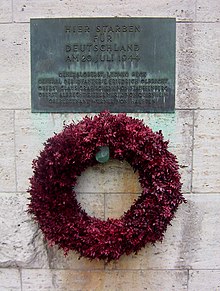German resistance to Nazism
Appearance


German resistance to Nazism (German: Widerstand gegen den Nationalsozialismus) was the opposition by individuals and groups in Germany to the Nazi regime between 1933 and 1945.
Quotes
[edit]- Anarchism had belonged to the most active resistance fighters against Nazi Germany, and their numbers had been decimated by the ruthless National Socialist persecution. Between 1919 and 1923 there had been approximately 1500,000 anarchists in Weimar Germany. By the end of the Weimar Republic, about 50,000 activists remained. In 1945 their numbers were down to 15,000, and many of those were seriously ill as consequence of torture and persecution. Hence, anarchist groups in the immediate post-war period had no more than about 5,000 members.
- Stefan Berger, Social Democracy and the Working Class: in Nineteenth- and Twentieth-Century Germany. Routledge. 2014. pp. 184-185. ISBN 978-1-317-88577-1.
- Although much smaller than their communists and socialists counterparts, the German anarchist militia Schwarze Scharen (Black Flocks, or Black Troops) was founded in 1929 to protect meetings of the Free Workers' Union of Germany (FAUD) anarcho-syndicalist union and the Syndicalist-Anarchist Youth. Outfitted entirely in black with matching berets, the Schwarze Scharen paired their Nazi street-fighting with creative propaganda including puppetry, music, and street theater. (The communist and socialist also had choirs, theater, and various forms of agitprop.) Although their ranks never exceeded the hundreds, in some towns they represented the main anti-fascist opposition. Nonetheless, their confrontational methods were opposed by some of the FAUD anarchist unionists. As the political atmosphere intensified, the Schwarze Scharen started to store explosives. In May 1932, based on a tip from an informant, their cache was raided. The arrests that followed this discovery, paired with Hitler's rise to power, sealed the fate of the Schwarze Scharen.
- Mark Bray, Antifa: The Antifascist Handbook. Melville House. 2017. p. 22. ISBN 978-1-61219-704-3.
- The scale of the movement was impressive, with over 120 committees established nationwide. The Leipzieg Antifa claimed 150,000 adherents. Many of these organisations broke through entrenched social barriers to include foreign slave labourers and establish working class unity across political parties and trade unions. Their functions ranged from creating local democracy, to restoring basic services like food suply. [...] The fact that so many committees adopted similar names and policies poses the question of whether there was a centralised organisation at work. Communists were prominent in nearly every Antifa despite the opposition of Moscow. Walter Ulbricht, the KPD leader, criticised the 'spontaneous creation of KPD bureaus, people's committees, and Free Germany committees', but he could do little as the KPD central apparatus had no communication link with the rank and file. Once communications were restored he could report: 'We have shut these [Antifas] down and told the comrades that all activities must be channelled through the state apparatus.' The Western Allies were equally disconcerted by the Antifas self-proclaimed 'ruthless struggle against all remnants of Hitler's party in the state apparatus, the local authorities and public life'. The US authorities expelled the Leipzig committee from its offices, ordered the removal of all leaflets and posters from the streets, and then banned it. Any further use of the name 'Free Germany National Committee' would be punished severely. The military government stopped Solingen's workplace councils purging Nazi activists and then abolished them. Brunswick's Nazis had been arrested by the Antifa, but were liberated by Allied command. When Frankfurt Antifa housed people made homeless by bombing in apartments abandoned by fleeing Nazis, the authorities evicted them.
- Donny Gluckstein, A People's History of the Second World War: Resistance Versus Empire. Pluto Press. 2012. p. 133. ISBN 978-0-7453-2803-4.
External links
[edit]- Official website of the acclaimed documentary of the resistance, The Restless Conscience, by Hava Kohav Beller
- German Resistance In The Third Reich – A Survivors Story Website documenting Arnold Hencke's resistance to the NAZI party and his subsequent imprisonment at Fuhlsbüttel concentration camp, by Greg McClelland.
- Sophie Scholl – The Final Days film website (in English)
- Sophie Scholl – Die letzten Tage film website (in German)
- The Geschwister-Scholl-Institut
- European Resistance Archive (ERA) | video interviews with members of the resistance
- Testimony of Gisevius in the Nuremberg Trials

